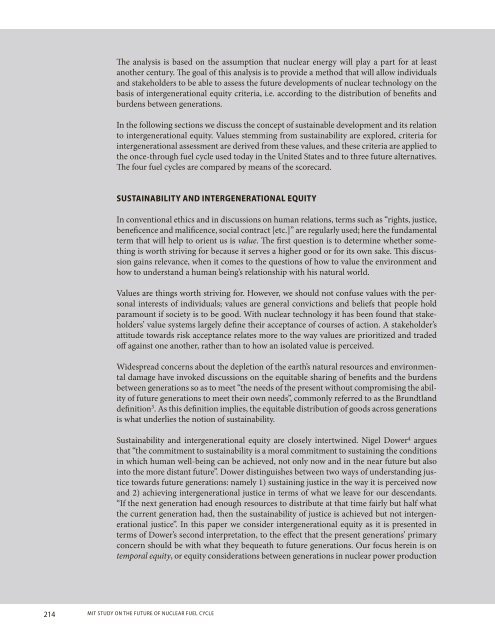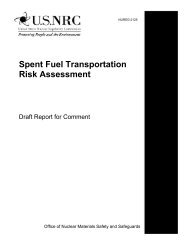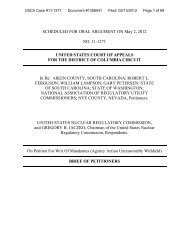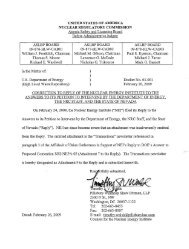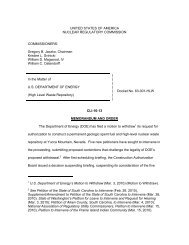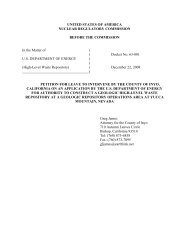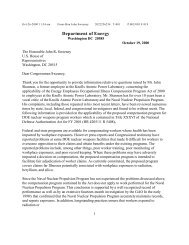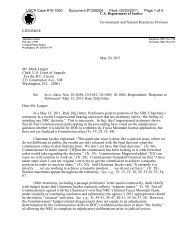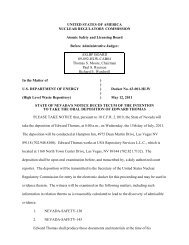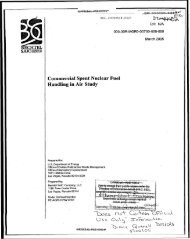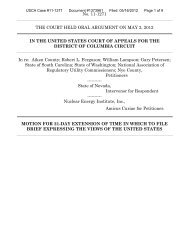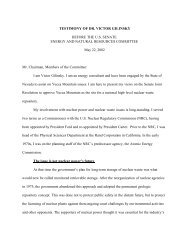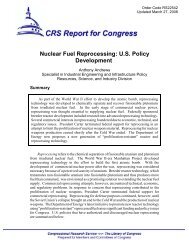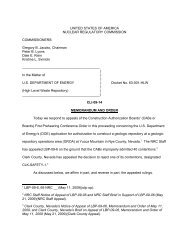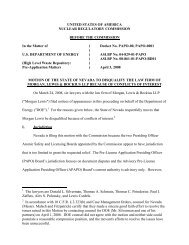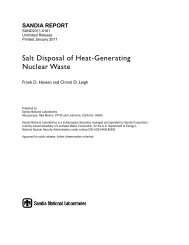The FuTure oF nuclear Fuel cycle - MIT Energy Initiative
The FuTure oF nuclear Fuel cycle - MIT Energy Initiative
The FuTure oF nuclear Fuel cycle - MIT Energy Initiative
You also want an ePaper? Increase the reach of your titles
YUMPU automatically turns print PDFs into web optimized ePapers that Google loves.
<strong>The</strong> analysis is based on the assumption that <strong>nuclear</strong> energy will play a part for at least<br />
another century. <strong>The</strong> goal of this analysis is to provide a method that will allow individuals<br />
and stakeholders to be able to assess the future developments of <strong>nuclear</strong> technology on the<br />
basis of intergenerational equity criteria, i.e. according to the distribution of benefits and<br />
burdens between generations.<br />
In the following sections we discuss the concept of sustainable development and its relation<br />
to intergenerational equity. Values stemming from sustainability are explored, criteria for<br />
intergenerational assessment are derived from these values, and these criteria are applied to<br />
the once-through fuel <strong>cycle</strong> used today in the United States and to three future alternatives.<br />
<strong>The</strong> four fuel <strong>cycle</strong>s are compared by means of the scorecard.<br />
SuStainability and interGenerational equity<br />
In conventional ethics and in discussions on human relations, terms such as “rights, justice,<br />
beneficence and malificence, social contract [etc.]” are regularly used; here the fundamental<br />
term that will help to orient us is value. <strong>The</strong> first question is to determine whether something<br />
is worth striving for because it serves a higher good or for its own sake. This discussion<br />
gains relevance, when it comes to the questions of how to value the environment and<br />
how to understand a human being’s relationship with his natural world.<br />
Values are things worth striving for. However, we should not confuse values with the personal<br />
interests of individuals; values are general convictions and beliefs that people hold<br />
paramount if society is to be good. With <strong>nuclear</strong> technology it has been found that stakeholders’<br />
value systems largely define their acceptance of courses of action. A stakeholder’s<br />
attitude towards risk acceptance relates more to the way values are prioritized and traded<br />
off against one another, rather than to how an isolated value is perceived.<br />
Widespread concerns about the depletion of the earth’s natural resources and environmental<br />
damage have invoked discussions on the equitable sharing of benefits and the burdens<br />
between generations so as to meet “the needs of the present without compromising the ability<br />
of future generations to meet their own needs”, commonly referred to as the Brundtland<br />
definition 3 . As this definition implies, the equitable distribution of goods across generations<br />
is what underlies the notion of sustainability.<br />
Sustainability and intergenerational equity are closely intertwined. Nigel Dower 4 argues<br />
that “the commitment to sustainability is a moral commitment to sustaining the conditions<br />
in which human well-being can be achieved, not only now and in the near future but also<br />
into the more distant future”. Dower distinguishes between two ways of understanding justice<br />
towards future generations: namely 1) sustaining justice in the way it is perceived now<br />
and 2) achieving intergenerational justice in terms of what we leave for our descendants.<br />
“If the next generation had enough resources to distribute at that time fairly but half what<br />
the current generation had, then the sustainability of justice is achieved but not intergenerational<br />
justice”. In this paper we consider intergenerational equity as it is presented in<br />
terms of Dower’s second interpretation, to the effect that the present generations’ primary<br />
concern should be with what they bequeath to future generations. Our focus herein is on<br />
temporal equity, or equity considerations between generations in <strong>nuclear</strong> power production<br />
214 <strong>MIT</strong> STudy on <strong>The</strong> <strong>FuTure</strong> <strong>oF</strong> <strong>nuclear</strong> <strong>Fuel</strong> <strong>cycle</strong>


